My Week with Marilyn
 for some language.
for some language.
Reviewed by: Scott Brennan
CONTRIBUTOR
| Moral Rating: | Offensive |
| Moviemaking Quality: |
|
| Primary Audience: | Adults |
| Genre: | Biography Drama |
| Length: | 1 hr. 39 min. |
| Year of Release: | 2011 |
| USA Release: |
October 9, 2011 (festival) November 23, 2011 (limited—125+ theaters, then wider) DVD: March 13, 2012 |
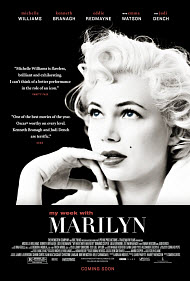





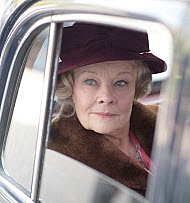
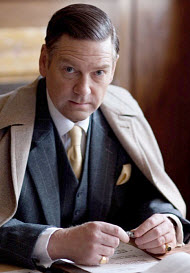
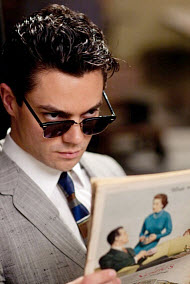


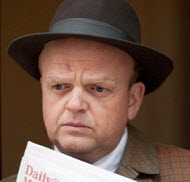

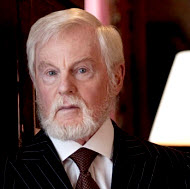

idolatrous worship of money and youth
TRUE LOVE—What is true love and how do you know when you have found it? Answer
sadness
worldliness
| Featuring |
|---|
|
Michelle Williams … Marilyn Monroe Emma Watson … Lucy Geraldine Somerville … Lady Jane Clark Toby Jones … Arthur Jacobs Dougray Scott … Arthur Miller Judi Dench … Dame Sybil Thorndike Eddie Redmayne … Colin Clark Julia Ormond … Vivien Leigh Kenneth Branagh … Sir Laurence Olivier Dominic Cooper … Milton Greene See all » |
| Director |
|
Simon Curtis |
| Producer |
|
The Weinstein Company BBC Films Lipsync Productions See all » |
| Distributor |
“My Week with Marilyn” has OSCAR® written all over it, in more than just the Best Actress category, with Michelle Williams’ astounding performance. Best supporting roles, screenplay adaptation, art direction or best costumes could easily be in the running, as well. I was impressed when the bad girl, Jen Lindley (Michelle Williams), from late 1990’s TV’s “Dawson’s Creek” landed a Best Supporting Actress nod a few years ago in “Brokeback Mountain” playing the wife of Heath Ledger’s infamous role as Ennis Del Mar. Off screen, Ledger and Williams started a romance and had a baby together who they named Matilda Rose Ledger. Unfortunately, their engagement ended in 2007, the year before Ledger’s tragic overdose, reportedly due to the constant separation created by their respective work schedules.
I bring up the previous details only because I would guess that some of this tragedy is where Michelle was able to muster up the depth of character she portrayed as Marilyn in this film. For the first time ever, I think, I really felt the true sadness of Marilyn Monroe’s life (having only read about it heretofore), torn between wanting to be accepted for who she was as Norma Jeane Mortenson, yet driven to seek and sustain the fame she desired in order to prove her self-worth. Throughout the film I wondered how much Michelle was stirring up the sorrow she experienced with the loss of her daughter’s dad, Heath, who at age 28, just 8 years younger than Marilyn, left this world, ironically, in the fog of a drug-induced state, under mysterious circumstances.
Whatever it was she did, she did it well. I believe this to be a credit to 1) the writing of Adrian Hodges, 2) the understated and well-acted role of Colin Clark as played by Eddie Redmayne, as well as 3) Williams’ stunning portrayal of Marilyn, down to the smallest details. After only a few scenes into the film, Michelle disappears from the big screen and all that remains is the larger than life persona of Marilyn Monroe, herself. Williams is a revelation and is sure to give Meryl Streep in “The Iron Lady” a run for her money at the next Academy Awards®. (Marilyn Monroe vs. Margaret Thatcher)
That said, there is nothing like a film of this magnitude to remind movie lovers, like myself, just how shallow and insipid this industry can be at times. The wars between Hollywood movie stars and the serious theatrical actors of either New York or London, the never ending battle between writers, producers, and actors—coupled with the idolatrous worship of money and youth—all set the stage for worldliness in its purest form. Add a dash of seduction, adultery, and the voluptuous Marilyn to inspire lust, and the darkest desires in the recesses of men’s minds everywhere, and you have the makings for “sin on the silver screen” (my coined phrase as of this review).

The film is based on two books by the late Colin Clark (portrayed by Eddie Redmayne, a name that will be commonplace in the near future after this role). Clark was a British writer and filmmaker who specialized in films for cinema and television about the arts. He was the son of the art historian Lord Clark and brother to political and military historian, Alan Clark.
In the summer of 1956, Colin Clark (Eddie Redmayne) worked as an assistant on the British set of “The Prince and the Showgirl” which stars Sir Laurence Olivier (played by Kenneth Branagh) and Marilyn Monroe. It was also Olivier’s directorial debut, a role he quickly vacated after this trying escapade with Marilyn, which is made clear in the film. It’s remarkable how much the scenes portrayed from “The Prince and the Showgirl” are like the original movie—capturing all the comedic flare of Marilyn—only it’s far more interesting with the background provided by Clarks’ books and Hodges’ script. Clark, educated at Eton College, and a son of privilege himself, worked for free as the assistant in this film, just to break into the business and prove to his father that he could make something of himself with this career choice, or, at least, that is the way he tells it. Because the script is based on his own memoirs, only the players themselves know how much of it actually happened or to what extent. Nonetheless, it makes for an interesting story.
As it happens, Marilyn is also on honeymoon with her new husband, playwright Arthur Miller. (Miller was her 3rd and final husband, before her untimely death.) When Miller leaves the country, Clark introduces Monroe to British life. Since it was Clark’s job to see to it that she got to the set on time and in one piece, they end up spending some moments together, mostly during the time Marilyn is having her “breakdowns” while shooting, and asks for him, and him alone to be her comforter. The film centers on these vignettes, her rendezvous’ with Colin, at which time she escapes from her Hollywood persona and the pressures of work, and reveals the childlike innocence that under girds the Marilyn she portrays to the rest of the world.
Content for concern
I have already alluded to the dark nature of the film in paragraph four, which is why the film is for adults only. However, surprisingly, there is not too much objectionable material in the film, compared to most films in this genre. There is the persistent smoking of cigarettes, common to the period, and the corresponding clinking of martini glasses and the drinking of alcohol. There are a handful of obscenities, including a$$, dam#, and 3 variations of the “f” word, but they are spaced throughout the film and hardly noticeable. There ia one use of the word Jesus, and one Jesus Christ, and they aren’t using his name in reverence. There are the moments when Marilyn, a married woman, is flirtatious and is putting the moves on Clark (which included a couple of kisses), while inviting him to cuddle with her in bed when she is sick or inebriated, which he did, but with all his clothes on. (Explicit warnings about this kind of woman are clear in Proverbs 7:12-20.)
There are no sex scenes per se, with one exception: the scene which undoubtedly earned the “R” rating (otherwise it would probably have been PG-13) is a partial nude scene where Marilyn quickly strips down at a riverbank and jumps in, enticing Clark to do the same. The camera only gets her back side for a few seconds, as she is entering the water, and frankly, it looks more like a painting in the Louvre, although admittedly alluring. Clark does reluctantly join her for a quick splash and a kiss, but apparently without conscience to his adulterous actions. Notably, he keeps his underwear on and hides himself as he exits the water, as a 23 year old would in the late 1950’s—in the presence of a 30 year old woman—especially if she was Marilyn Monroe.
If you are a movie lover and can easily compartmentalize films made by the world, for the world, and from a worldview other than Christian, then this is a film you’ll probably want to see. If you are offended at the elements I mentioned in my “content for concern” above, then this film is by all means “a skip.” The only other comment I have here is that I believe this film was done true to life, in a refreshing sort of way, and I didn’t feel like there was anything gratuitous about it—which could easily have been the case, considering the subject matter—a credit to Simon Curtis on his big-screen-directorial-debut. (For this reason I almost gave this an “average” in the morality range for a film in this genre—which is by no means an endorsement by this Web site. In fact, as a reminder, only an “above average” would be considered acceptable—on any level—for normal Christian viewing.)
For example, when Colin got into the bed with Marilyn (clothed), it seemed like he was going to keep one foot on the floor—keeping to the mores of the day. There is a purposeful innocence to the film to create the illusion of unrequited “first love” through the eyes of Colin Clark, even though we know there was a much darker side to Marilyn, in reality.
In the final analysis, there is a sadness that permeates the film and touches the heart on a deeper level. It’s a sense of desperation that lurks in the human condition and speaks to us all—the ever-present desire to be recognized for who we are as “human beings” and not “human doings.” It is the constant human quest for true love and intimacy, which can only be filled by our reconnection with the creator (John 17:22) and not the creature (Romans 1:25).
Sadly, it’s that desire for recognition that propels so many young people into the entertainment world, in a headlong plunge, like Marilyn, without having their feet firmly planted in reality, knowing who they are without Christ (Eph. 2:1), who they are becoming with Christ (Gal. 2:20), and where they will ultimately end up in the future because of Christ (Rev. 20:6). During my review of this film, I found the following quote from Heath Ledger, which sadly encapsulates this worldview (Luke 15:13):
“I’m not good at future planning. I don’t plan at all. I don’t know what I’m doing tomorrow. I don’t have a day planner and I don’t have a diary. I completely live in the now, not in the past, not in the future.”
It wouldn’t be such a bad philosophy, if one has asked all the important questions ahead of time—and then found the answers: Where did I come from? Why am I here? And Where I am I going? I wonder if Marilyn ever asked herself any of those questions. If she did, I wonder what she ended up believing were the answers?
Violence: None / Profanity: Moderate / Sex/Nudity: Moderate
See list of Relevant Issues—questions-and-answers.


Moral rating: Average / Moviemaking quality: 4
PLEASE share your observations and insights to be posted here.


As good as Miss Williams was as Marilyn, her character would have been nothing without the lovelorn Colin Clark who had to stand toe to toe with her without making it appear a difficult challenge for an actor. I think Eddie Redmayne deserves as much credit as Miss Williams does for the success of the film. You can see on his face in every scene he has with the matchless beauty that he thinks he’s living in a dream.
Director, Simon Curtis took great care in making this a film not so much about her outward appearance, but more for the turmoil that stirred within her. For that’s how it is in God’s world. “People look at the outward appearance, but the LORD looks at the heart.” (I Sam. 16:7 NIV).
As the reviewer wrote, the film barely deserves its R rating by the use of half a dozen “F” words. The only nudity is two shots from Miss Monroe’s backside.
This is a great character study of perhaps one of the most famous actresses there ever was or will be, and Michelle Williams deserved her Oscar nomination. But I think Colin Clark should have been nominated as well for his supporting role. Hollywood doesn’t make films with the Christian audience in mind, but this could have been a lot more offensive from a sexual point of view. I credit Mr. Curtis for not taking cheap shots from that angle and just concentrating on the character of the famed ill-fated actress.
My Ratings: Moral rating: / Moviemaking quality: 4½